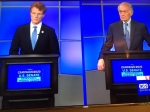 What’s the real reason Congressman Joe Kennedy is challenging Massachusetts Senator Ed Markey this year? It may well be that he fears if he waited for an open race for the Senate, after Markey or Senator Elizabeth Warren, he might have to run against Congresswoman Ayanna Pressley. Pressley spoke Friday to a virtual meeting of The New England Council. She was powerful, articulate, brilliant, and passionate. Her energy and vision, not to mention her proven and charismatic voter appeal, could prove insurmountable for Congressman Kennedy in some future head-to-head or crowded primary.
What’s the real reason Congressman Joe Kennedy is challenging Massachusetts Senator Ed Markey this year? It may well be that he fears if he waited for an open race for the Senate, after Markey or Senator Elizabeth Warren, he might have to run against Congresswoman Ayanna Pressley. Pressley spoke Friday to a virtual meeting of The New England Council. She was powerful, articulate, brilliant, and passionate. Her energy and vision, not to mention her proven and charismatic voter appeal, could prove insurmountable for Congressman Kennedy in some future head-to-head or crowded primary.
Other than that, after months of campaigning and several debates, Kennedy’s reasons for running against Markey remain unclear. You can’t see any daylight between their positions on issues. Kennedy argues for removing Markey in bromides, insisting, as he did in a recent debate in Springfield, that “we can’t do what we need with people who have been there for fifty years.”
Kennedy insists that Markey doesn’t show up enough in the western part of the state. Markey swats the charge away, easily ticking off the local issues for which he has provided concrete solutions (legislation plus funds) and touts his endorsements by seven mayors of significant cities in the region.
Even though Joe Kennedy’s Uncle Ted, the “lion of the Senate,” was reelected at about the same age as Markey is now, the Congressman seems to be hoping his youth would be enough of a reason to oust the veteran Senator, just as Pressley ousted longtime veteran Mike Capuano two years ago. Kennedy’s fundraising pitches speak to Markey’s long incumbency. But Kennedy hasn’t been able to weaken Markey’s argument that the Senator has been and remains a leader on cutting-edge issues, including Wall Street insider trading, gun safety, net neutrality and perhaps no issue as important as climate change.
A co-sponsor of the broadly outlined Green New Deal and sponsor for years of laws to reduce carbon emissions and support renewables, among others, Markey impresses by his depth of scientific understanding, the authenticity of his passion, his capacity to legislate on all aspects of the issue and his ability to communicate the urgency of the need for action. As I have written before, if the Democrats can take back the Senate, hold the House and capture the Presidency, Markey will have an opportunity to lead this country away from a dystopian environmental future and set us, our children and grandchildren on a more sustainable path. Kennedy insists he will be “a stronger presence” in the Senate than Markey. But, if the Republicans retain control of the Senate, Kennedy hasn’t established that he will be any better equipped than Markey in dealing with Mitch McConnell.
When Kennedy says he can “get more out of the seat” than Markey, it is reminiscent of Ted Kennedy’s 1962 Senate campaign against MA Attorney General Eddie McCormack. In a debate, McCormack famously said, “If your name was Edward Moore instead of Edward Moore Kennedy, your candidacy would be a joke.” Joe Kennedy’s candidacy is not a joke. It is much more substantive and merit-based than was Ted Kennedy’s first run at office, but the Congressman’s rationale is not much more compelling.
Kennedy is the more affable of the two, with a boyish amiability, even apparent humility. Markey, more intense, smiles less often. Both candidates can be annoying in their speech patterns, Markey for a staccato style of speaking, Kennedy for devolving into breathlessness at the end of sentences. But, hey, Abraham Lincoln had a sad countenance and a squeaky voice.
What’s most galling are the millions of dollars being misspent on this Senate race and the battle to fill Kennedy’s fourth district seat in the House.
That money would be much better spent on winnable races that could tip control of the Senate to the Democrats. Better to contribute to help Sara Gideon defeat Susan Collins in Maine, Mark Kelly defeat Martha McSally in Arizona, John Hickenlooper against Cory Gardner in Colorado, Cal Cunningham over Thom Tillis in North Carolina, Steve Bullock over Steve Daines in Montana, Theresa Greenfield against Joni Ernst in Iowa, and even longer shots Jon Ossoff against David Perdue in Georgia, Amy McGrath against Mitch McConnell in Kentucky and Jaime Harrison over Lindsay Graham in South Carolina.
Instead we are wasting time in Massachusetts, squandering talented campaign staff and contributor dollars, where the winner’s future voting record is likely to be indistinguishable from that of the loser. And, if low information voters hold sway, we could lose important leadership on what may well be the most important public policy issue of our children’s lifetime. But alas, here we are, in a hotly contested race on home turf and still without a persuasive answer to the question, “Why?”